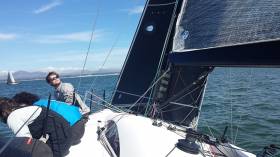Displaying items by tag: Ker 37
Key Yachting Have Two Great Irish Based Cruiser Racers For Sale & Ready for 2022 Regattas
A new boat has just been added to the Key Yachting brokerage listing in Ireland writes Key Yachting Ireland representative Mark Mansfield
The 2016 J/112e—Jib and Tonic has just gone on the market and is ready to race or cruise for the 2022 season.
She Joins Jump Juice, the very well-known Ker 37 also listed by Key Yachting.
J/112e—Jib and Tonic
 The 2016 J/112e—Jib and Tonic
The 2016 J/112e—Jib and Tonic
Both boats could be launched and raced straight away with good bottom finishes, engines recently serviced and good sail inventories.
Either of these could be racing in Wave Regatta in June, Round Ireland Race in June, Cork Week Regatta in July, or racing and cruising around Schull in August and doing Calves Week.
 J/112e Jib and Tonic on her berth at Dun Laoghaire Marina
J/112e Jib and Tonic on her berth at Dun Laoghaire Marina
The newest listing is the very fresh and very lightly used J/112e, Jib and Tonic.
As is known, the J/112e is an exceptional performer on IRC, with versions of this design having won the IRC/ORC World Championships in the past, winning Cowes Week 2021 and winning the 2021 ORC World Championships.
The J/112e also has a very comfortable interior, with two comfortable double cabins, and a very roomy and comfortable main saloon. Her sail and instrument inventory is impressive and on average she has only been used about 15 days a year since new and this is shown by only 97 hours on the engine. The engine is just serviced and she is being antifouled this week. She is ready to go.
 J/112e Jib and Tonic interior
J/112e Jib and Tonic interior
Click for full brokerage details of Jib and Tonic
Jump Juice, the Ker 37
 Jump Juice—Ker 37
Jump Juice—Ker 37
Jump Juice, the Ker 37, is also ready to go and, like Jib and Tonic, has a particularly impressive sail inventory.
A substantial refit was done on her a few years ago including upgrades to instruments and a paint job on the hull. Jump Juice has been a consistent winner in the past and apart from her speed, is a particularly impressive and attractive yacht—a real head-turner.
Click for full brokerage details of Jump Juice
Full details for each of these Irish VAT paid yachts are available below in the links. Further information can be got from Mark Mansfield of Key Yachting at, [email protected] or ph. 00 353 87 2506838.
Jump Juice—Iconic Ker 37 is For Sale
Key Yachting Ireland is delighted to announce that they have the sale of the iconic 2006 one-off Ker 37, Jump Juice, designed by Jason Ker and beautifully built by Vision Yachts in Cowes.
Following on from the quick and successful sales of the J122 Kaya and J99 Juggerknot 2, Key Yachting are delighted to continue exhibiting their prominence in selling performance yachts – of any make – in Ireland.
 Jump Juice sailing upwind
Jump Juice sailing upwind
Likely, she is the last of the boats remaining in Ireland, built for the Commodores cups in 2006 and 2008, when Ireland had three teams competing in the event.
Jump Juice has remained in the same ownership throughout and kept in great condition, including a major refit and repaint in Cowes in 2016.
Jump Juice has won many events she has competed in over the years, including overall wins at Scottish Series and Uk IRC Nationals, plus class wins in many other regattas such as Irish IRC champs, Volvo DL Regatta, Cork Week, etc
Mark Mansfield, broker for Key Yachting Ireland, is selling her and has significant knowledge of this particular boat, having helmed her in those Commodores cup days, and competed against her in more recent times.
”Jump Juice is still a fantastic racing boat, and particularly in light to medium winds, she is very impressive. She possesses a great fresh suit of North sails, which means a new owner can do the next few years without having to purchase new sails. Her running rigging is in good order, her hull is race-prepared each year and is in great condition”.
Jump has only been raced approx 15 days per annum for the last number of years and in fact, in the Covid 2020 year, only raced two days in total.
B&G instruments (incl computer and tablet), High Modulus carbon Formula spars mast, electric-powered Hydraulic backstay and a cradle are all part of her inventory. A race trailer is also available under separate negotiation.
 Jump Juice on her cradle
Jump Juice on her cradle
Jump Juice is a highly desirable and beautiful Yacht that can return a new owner many years of great sailing and racing. At an asking price of €119,000, VAT paid, she is ready to launch and race.
The boat has a 40-footers speed with the benefit of 37-foot overheads and crew size.
For further information, click here
Mark Mansfield can be contacted at [email protected] or 00353 87 2506838. Jump is presently Lying in Cork, out of the water, fully covered.
Royal Cork Yacht Jump Juice Extends Lead at Abersoch Keelboat Week
Conor Phelan's Jump Juice established a firm grip on Abersoch Keelboat Week yesterday, winning both races in very light airs. The Royal Cork YC Ker 37 was on fire in IRC 1, winning race six by over a minute and race seven by a whopping 24 minutes.
Two races are scheduled this morning in a medium air forecast for the final day. Fingers are crossed for a repeat of Jump Juice's 2015 victory, says mainsheet trimmer/crew boss Maurice O'Connell.
See results here.






























































